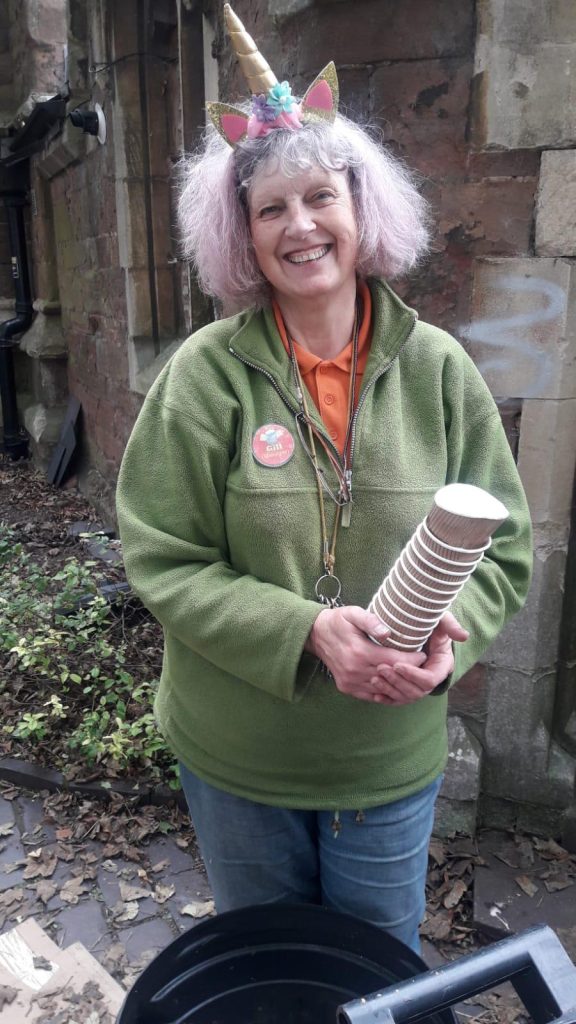The Food Justice Network was set up during the pandemic to coordinate the city’s emergency food response. Today the network brings more than 280 independent member organisations together. As ensuring food security becomes increasingly difficult and demand soars, this alliance has never been more important.
Click through the slides, to read the story:

St Michael's Foodbank is a member organisation, we spoke to Gillian to hear her take on the Food Justice Network
Well, I started the food bank at St Michael’s nearly four years ago at the beginning of the first lockdown. When I heard about the Food Justice Network, I joined immediately and I’ve been I’ve been involved ever since.
Before lockdown we started a community lunch. When covid hit we became very worried about the food poverty that we knew was going to happen in our area. So we decided that we would start a food bank because we could do that in a socially distanced way. We started from the boot of my car. We didn’t get very many at the start, but it gradually increased. Now 140 people come each week. We don’t ask for vouchers or referrals or anything like that, it’s purely a drop in, and we can’t see that we’re going to be able to close anytime soon.
Before lockdown we started a community lunch. When covid hit we became very worried about the food poverty that we knew was going to happen in our area. We knew there were going to be difficulties, so we decided that we would start a food bank because we thought that we could do that in a socially distanced way. We started in a very small way outside the church from the boot of my car. We didn’t get very many at the start, but it gradually increased. Now 140 people come each week. We don’t ask for vouchers or referrals or anything like that, it’s purely a drop in, and we can’t see that we’re going to be able to close anytime soon.
We’re an unincorporated association. What we’re doing isn’t ‘charity’ in inverted commas, because we are certainly not going around and handing out things to people. We’re not there to impose anything on anyone and we’re not there to judge. For us, we are very much embedded in the community, most of us live reasonably locally in an area that is one of the 10% most deprived in the country. I think it’s basic humanity. It’s looking at what is happening in the world and wanting to make a difference for the people who are struggling.
I don’t think I contribute as much as I should because of time pressures really. I have responded to requests for emergency food in my local area, when people have asked for things that we’ve got plenty of, like nappies, clothes, or surplus food. We’ve also been on the receiving end of other people’s surplus things, so it’s very much a reciprocal thing. There’s also the campaigning aspect of the Food Justice Network, which I’ve always been interested in, so I try to respond to interviews and questionnaires and what have you.
I have asked various questions, particularly as the food bank developed. When there were some issues, it was very useful to be able to put a message on the group to say “What do other people do about this?” So sharing of information, sharing experiences it’s much better than trying to reinvent the wheel because other people who may have been doing it longer, may be doing it differently. Now, we’ve got an awful lot of knowledge and experience to share and I think that’s that is really good.It’s nice to talk about funding as well and get information, particularly from Florence’s posts. That is handy I think for everybody. As well as a general sense of support, knowing that you’re not alone in what you’re doing and that there are people there who are, who are ready and willing to help with whatever people need.
Definitely food waste. One of my volunteers works at local supermarket; she sees a tremendous amount of food waste in her branch and she is sure that other branches have exactly the same thing. Another food bank that that I know of goes to a big wholesaler for surplus food and as well as collecting the food, he sees that that a tremendous amount is thrown away. So I think there is a much bigger problem out there than people realise. I used to volunteer for FareShare and I know that manufacturers and distributors will put things in landfill for spurious reasons, like the label has been put on upside down, whole lorry loads of tomato ketchup or whatever are thrown into landfill because of that kind of thing. That’s what FareShare have been trying to do to divert those lorry loads, but they can’t do it all and then so much more is needlessly wasted. So I think that is a really important thing to focus on.
You can explore who else is part of the Food Justice Network here.






See more information at: https://theaws.co.uk/food-provision-database/

